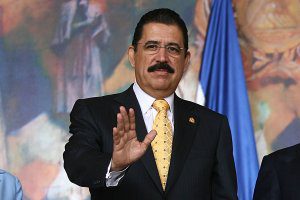President Manuel Zelaya. Photo: Ricardo Stuckert/PR Agência Brasil (CC BY 3.0 BR)
Since the 2009 military coup d’état against President Manuel Zelaya, structural racism, the narcotics trade, tourist development, mining, neoliberal economic policies, and right-wing governments have had a detrimental impact on the Garifuna people in Honduras.
The Garifuna are an Afro-Caribbean people expelled by the British from the Islands of St Vincent and Dominica in 1797, and relocated in Belize Guatemala, Honduras, and Nicaragua. The Garifuna are a mixture of African, Arawak, and Kalinago Carib peoples, speaking English, Creole, and Spanish.
Land confiscation of traditional Garifuna territory for palm oil plantations along the Caribbean coast of Honduras has been accompanied by repression and kidnapping by the Directorate of Police Investigations (DPI). After Colombia, Honduras is the second-largest palm oil producer in Latin America with 193,000 hectares cultivated. Land purchase agreements on Garifuna territory have been supported by the World Bank, the International Monetary Fund (IMF), and the Inter-American Development Bank (IDB).
In 2023, four Garifuna leaders were murdered, taking the total to more than 150 killed since 2018. In June 2024, the Honduran police and military raided the community of Trujillo and tried to arrest its Garifuna residents. The police were allegedly protecting the interests of three Canadian tourist investors who had previously been charged with money laundering and fraud relating to the sale of Garifuna lands. Garifuna territory has also been infiltrated by drug groups which cultivate coca to produce cocaine for the US markets.
There are 43,000 Garifuna people in Honduras. They have long faced human rights abuses, forced displacement, and violence from political and organised crime gangs. According to British NGO, Global Witness, Honduras is one of the deadliest countries in the world for land and environmental activists. In 2024 there were 245 attacks against land defenders. Garifuna community leader, Miriam Miranda, says that in the past five years, Garifuna people have been murdered “at an unprecedented rate.” Violence and dispossession have so destroyed the social fabric of some communities that the Garifuna now face genocide. “Honduras is a country where impunity reigns,” Miranda added: “The communities, neighbourhoods, and the cities have to find ways to work against violence and against dehumanisation.” Due to the ongoing violence, many have migrated to the USA.
In the 1980s the US government built a military base in Honduras which supported the Nicaragua Contras, then fighting the left-wing Sandinista government. In 1992 the right-wing government of President Rafael Callejas passed the Agricultural Modernization Law, a counter-reform that ended protections for community property, allowing an intensified invasion of Garifuna territory. The murder of Black and Indigenous land defenders in Honduras began soon after.
The Garifuna human rights organisation, Organización Fraternal Negra Hondureña (OFRANEH), the Black Fraternal Organization of Honduras, has brought two cases against the Honduran government to the Inter-American Court of Human Rights for violations of Garifuna territorial rights. In 2015 the Court ruled in favour of the Garifuna, ordering the government to protect communal lands from land grabs. The government has yet to comply with the findings, and property titles on Garifuna land continue to be sold to private investors.
In 2021 OFRANEH denounced the State of Honduras for committing genocide against the Garifuna. In August 2023, the Inter-American Court found Honduras responsible for the violation of Garifuna territorial rights.
Iris Xiomara Castro Sarmiento of the left-wing Liberty and Refoundation (LIBRE) party was elected president in January 2022. In February 2022, she blocked the sale of a large piece of land south of the capital, citing indigenous rights. The sale would have evicted indigenous people to build homes for 10,000 Hondurans.
In March, Castro banned open-pit mining. The government promised to intervene to conserve areas of “high environmental value” for the benefit of the population. Castro vowed to make a democratic socialist state, with an economic system based on social justice in the distribution of wealth and national income, and to put human beings before the rules of the market.
It was hoped that the election of president Xiomara Castro would bring change for the Garifuna. That little has changed reveals institutionalised state corruption, the power of international financial institutions, and the political and economic power of the traditional oligarchic families of Honduras.
Related Stories
Issue #2113
Source link : http://www.bing.com/news/apiclick.aspx?ref=FexRss&aid=&tid=66cc0848fc65458c969a50c6c1528279&url=https%3A%2F%2Fcpa.org.au%2Fguardian%2Fissue-2113%2Fgenocide-in-honduras%2F&c=1144166944835191212&mkt=en-us
Author :
Publish date : 2024-08-25 17:26:00
Copyright for syndicated content belongs to the linked Source.
